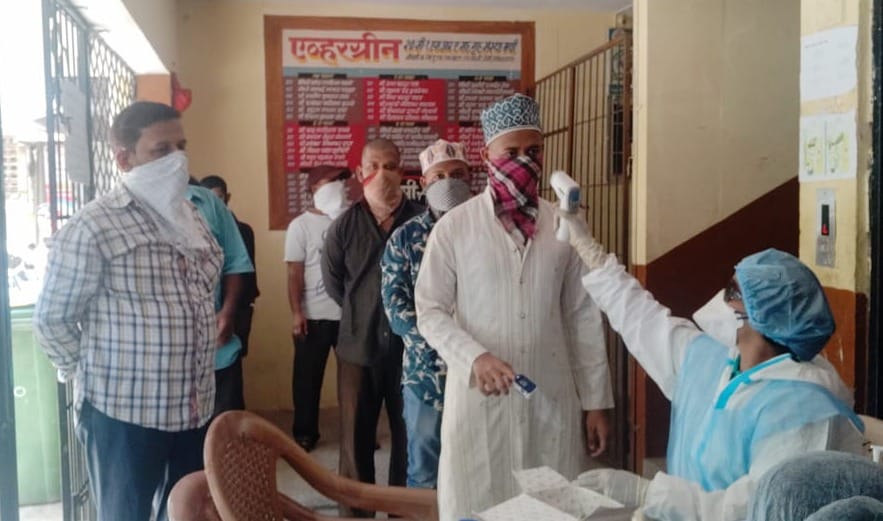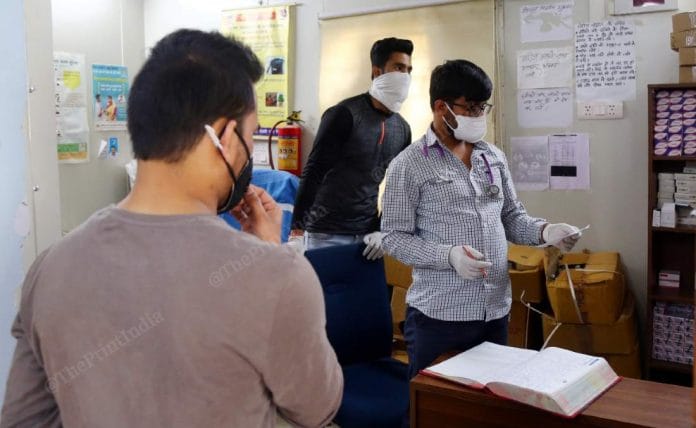New Delhi/Bengaluru/Mumbai: Ask Maharashtra, and they will laud the role played by fever clinics in controlling Covid-19 in slums like Dharavi, which presented an alarming prospect as a hotspot in the early days of the pandemic. But don’t expect the same enthusiasm from Andhra Pradesh, where the government dismisses fever clinics as a bureaucratic concept.
Set up as the first line of defence in the battle against the Covid-19 pandemic, fever clinics have evoked a mixed response around India.
The concept of fever clinics was laid out by the Union health ministry in a set of Covid-19-related guidelines on 7 April — the idea was to establish dedicated centres where people with Covid-19 symptoms like fever could be screened and, if necessary, guided towards testing facilities or hospitals for further medical attention.
It was meant to prevent an onslaught of suspected Covid-19 patients from overwhelming hospitals.
Three months down the line, states like Maharashtra and Tamil Nadu hail fever clinics as a crucial link in the Covid-19 response system. Delhi, meanwhile, is letting its mohalla clinics — medical facilities that offer free treatment and are meant to strengthen the national capital’s primary healthcare framework — play the same role.
Others like Andhra Pradesh have started fever clinics but are sceptical, with questions being raised about the wisdom of inviting suspected Covid-19 patients into the same enclosed space as others.
Also Read: Fever, cough, fear or myths — Indians are turning to e-doctors for all coronavirus ‘cures’
Setting up of fever clinics
In the guidelines issued 7 April, the health ministry asked states to set up dedicated spaces at health facilities — hospitals, community health centres — as fever clinics for triaging, which means classifying the urgency of an ailment to prioritise treatment for the more severely ill. The guidelines advised that the space be large enough to mitigate infection risk and that the fever clinics be set up at entrances.
While the terminology varies across states, typically, a fever clinic comprises a medical officer, a lab technician, and a staffer who prescribes medicines.
India had only recorded 4,421 Covid-19 cases when the setting up of fever clinics was advised. The number has since risen to 7,93,802, which makes the role of such facilities more crucial.
ThePrint talked to officials and experts across multiple states and Delhi to understand the role played by fever clinics as the first line of defence. Here’s what we found.
Also Read: Plasma therapy — 11 trials underway, many Covid ‘cure’ stories but some doubts linger
A game-changer in Mumbai’s slums
In Maharashtra capital Mumbai, fever clinics were set up in response to growing Covid incidence in the city’s high-density slums. The Brihanmumbai Municipal Corporation (BMC) protocol called for the identification of all high-risk contacts of Covid patients and putting them under institutional quarantine.
According to BMC data, Mumbai had 443 active fever clinics as of 7 July, which had screened 27,972 patients. Of these, 6,103 patients were subsequently tested. The number does not account for private dispensaries and door-to-door surveys.
The civic body started these fever clinics to screen people and identify patients at an early stage near containment zones. Each clinic here has a team of six — one doctor, two nurses and three community volunteers.
“The population in slums is such that the entire settlement becomes high-risk, but it is not possible to put everyone under institutional quarantine,” said Ashwini Bhide, additional municipal commissioner, eastern suburbs, Mumbai. “So, we started fever clinics near containment zones.”
Fever clinics helped the BMC reduce the load at hospitals, conduct Covid tests, and detect those with symptoms early.
In Dharavi, Asia’s largest slum that went from being a hotspot to one of the most stunning success stories in the Covid battle, the fever clinics have been credited with huge success.
When the first case was reported on 1 April, the BMC organised fever camps by inducting all private doctors in the area. “In Dharavi, where 80 per cent of the population uses community toilets, one cannot remain inactive. As many as 2,335 people were diagnosed in Dharavi’s fever clinics after contact-tracing 58,154,” said BMC assistant commissioner Kiran Dighavkar.
“Our first action is to stabilise the person’s oxygen levels. Based on the physical check-up, the doctor decides whether the patient needs a swab test and the municipal-ward-level war room is informed,” said Dr Jitendra Jadhav, health officer, L ward, one of Mumbai’s 24 administrative wards and home to a large slum population.

The BMC has set up control rooms in each of the city’s administrative wards. Swab tests are conducted at the nearest private lab. If the patient’s oxygen levels stabilise, but the doctor finds some other underlying illness, they are counselled and asked if they wish to continue further treatment.
Also Read: Karnataka govt to deploy robots to help doctors monitor Covid patients
Karnataka’s fever clinics helped identify, isolate early
In Karnataka, the first state to start fever clinics, health officials say around 25,000 patients had been screened at the facilities in capital Bengaluru as of 8 July. Out of these, 26 tested positive and were immediately quarantined.
Data from the state Covid war room shows that, as of 5 July, 34.5 per cent of the patients were symptomatic and 65.5 per cent asymptomatic. Many of the cases identified were through fever clinics, said health department sources.
“Fever clinics have been our first line of defence. Instead of having to rush patients to government hospitals and increasing the burden there, these clinics have helped us identify and isolate early,” said Karnataka Medical Education Minister Dr K. Sudhakar, who is overseeing Covid-19 management in the state.
The patient load, however, varies. “There were hardly 31 clinics that the government set up. Private setups also had created flu corners. We had approximately 25,000 people who came across 198 wards of the Bruhat Bengaluru Mahanagara Palike (the Bengaluru civic agency),” an official told ThePrint.
But not all doctors are as happy with the idea of fever clinics.“Fever clinics are not a good idea. In a situation like Covid-19, you would want to isolate the patients who come there. By asking people, both Covid and non-Covid, to come to one place will be more of a problem,” said Giridhar Babu, an epidemiologist and member of the Karnataka Covid expert committee.
Also Read: RCB homeground Chinnaswamy stadium to serve as Covid care centre in Bengaluru
Fever clinics huge hit in TN
With 72,500 cases as of 8 July, Chennai accounted for the majority of Tamil Nadu’s 1,22,350 coronavirus cases. Chennai has 13,723 fever camps or clinics across 15 locations — they started 8 May and had screened 8,79,606 people by 5 July, according to state government data. Of these, 37,616 people were tested and 10,569 Covid-19 patients identified.
Tamil Nadu Health Secretary Dr J. Radhakrishnan said fever clinics have been a huge hit.
“These fever clinics became very popular… as people could find them near their areas,” he added.
Tamil Nadu Chief Secretary K. Shanmugham has advised district collectors to adopt the successful “fever clinics model” in their jurisdiction. Shanmugham said these clinics have helped identify cases of influenza-like illness and will also help combat the Covid-19 situation.
Also Read: Tsunami, fire, floods, Covid — the IAS officer who has led fight against disasters in Tamil Nadu
Delhi relies on mohalla clinics
Unlike in other metros, Delhi neighbourhoods don’t have fever clinics. Instead, the national capital has 484 mohalla clinics. Mohalla clinics deal with all kinds of ailments, not just Covid-19 symptoms.
“We are seeing all kinds of patients as most are scared to visit hospitals now,” said Dr Arun Mangal, who works at a mohalla clinic in Paharganj.
As the first point-of-access to healthcare, mohalla clinics are meant to refer patients for Covid-19 tests.
These clinics have one doctor, one nurse, one pharmacist and a multi-tasker for additional jobs. Dr Shalley Kamra, nodal officer for mohalla clinics, said doctors at the facilities are trained in treating people showing Covid-19 symptoms and referring them for testing. “We have anyway ramped up testing so the more we test, the better it is,” she added.
“If a patient comes with a day-old fever, then we ask them to wait and watch for another couple of days. But if a patient comes with fever for 2-3 days, we refer them to the dispensary or the nearest hospital to undergo a Covid-19 test,” Dr Mangal said.
Dr Kamra said Delhi didn’t need separate fever clinics. “Mohalla clinics are already seeing patients with fever. Besides, mohalla clinics don’t have the capacity to start fever-only facilities,” she added.
The Delhi government’s nodal Covid-19 facility, Lok Nayak Jai Prakash Narayan Hospital, opened a fever clinic but it was shut down within days. “We stopped the fever clinic from the second week of April. Now all patients are going directly to OPD,” said Dr Ritu Saxena, the chief medical officer at LNJP Hospital.
At Ram Manohar Lohia Hospital, a central government facility, however, there’s a flu corner along with the OPD. “The flu corner, before the pandemic, was part of the OPD. Now, the flu corner helps in triaging patients,” said Dr Sanjeev Panesar, assistant professor for community medicine at RML Hospital.
A few private hospitals, including Rajiv Gandhi Super Speciality Hospital (RGSSH), have also set up flu corners.
At Sir Gangaram Hospital, the fever clinic has been merged with the Covid emergency ward. “The fever clinic that opened in March was an outdoor clinic but now it has been shifted to the Covid emergency ward,” said deputy medical superintendent Dr Suruchi Sinha. “Mild cases are sometimes observed for 4-6 hours in one section of the fever clinic now.”
Also Read: Delhi Mohalla Clinics battle mask shortage, delayed salary but continue quiet fight in pandemic
‘Bureaucratic’ concept for Andhra
In Telangana, each government hospital has a separate enclosure in the OPD ward that is being treated as a fever clinic, with private facilities like Apollo Hospital and Yashoda Hospital also following the same concept.
They are served by doctors in PPE kits on rotation basis. Known as sub-centres here, the clinics in Telangana predate the central government guidelines and were set up in March.
Cousin state Andhra Pradesh, meanwhile, is using its urban health centres — a public-private joint venture for free treatment, again predating the pandemic — in containment zones as fever clinics. Government officials said, additionally, state facilities have triage bays in the OPD for suspected Covid patients and those with fever. The state also has a 24×7 fever clinic at Vijayawada’s Railway Hospital.
Palasa MLA Seediri Appala Raju, a doctor by profession, has got seven fever clinics set up in the Palasa town after it recorded a spike in Covid cases.
However, Additional Chief Secretary P.V. Ramesh said fever clinics are bureaucratic. “Active surveillance is more important, the way we have mobile clinics now,” he added.
With inputs from Rohini Swamy and Manasi Phadke
Also Read: Mobile Covid testing takes off in Andhra as Jagan govt plans to add 53 state buses to fleet






